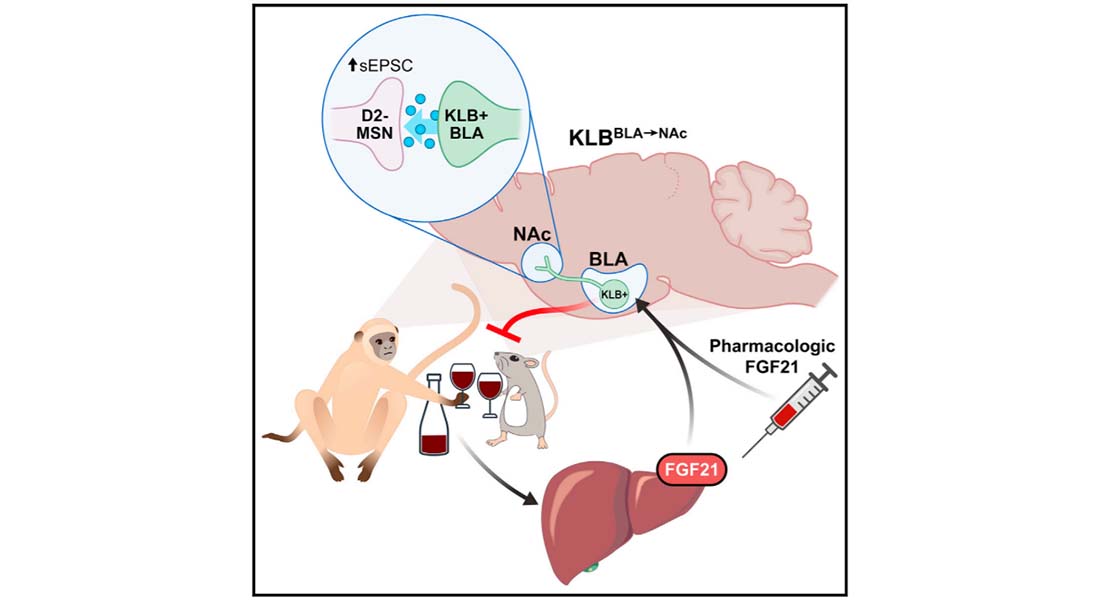Monkeys lose their taste for alcohol when given liver hormone FGF21
The liver naturally releases the hormone FGF21 after humans drink alcohol, which may lower our appetite for the intoxicant. Now an international team of scientists have shown that vervet monkeys, known for their love of alcohol, drink 50 percent less if given the hormone preventatively. The scientists are optimistic that their findings might contribute to new therapies to treat alcohol dependence.

Alcoholism is a major public health issue, affecting millions of people around the world. A number of different therapies have been developed to help treat alcohol dependency, but their success has so far been limited. An international team of scientists, including researchers at the University of Copenhagen, has now shown that the liver hormone FGF21 might be effective in limiting alcohol consumption in non-human primates.
FGF21 has already been shown to reduce alcohol preference in mice by targeting the central nervous system. But it was not clear whether this effect would transfer to hard-drinking primates, or which areas of the brain FGF21 targets to produce this effect.
Vervet monkeys given FGF21 drink 50% less
In their new research, published in Cell Metabolism, the international team of scientists showed both that FGF21 successfully reduces alcohol consumption in vervet monkeys – non-human primates that have a strong appetite for alcohol – while also identifying the specific areas of the brain that FGF21 targets and how this lowers alcohol preference.
“Mouse studies don’t always translate to humans, so it was very promising to see that FGF21 reduced alcohol consumption by 50 percent in vervet monkeys, which are much more similar to humans. Another positive result was the lack of side effects observed in monkeys given FGF21,” says Associate Professor Matthew P. Gillum from the Novo Nordisk Foundation Center for Basic Metabolic Research at the University of Copenhagen and co-first author of the research.
Promise for treating alcohol dependency
The liver normally releases the hormone FGF21 when humans drink alcohol. Genetic studies suggest that when it reaches the brain it reduces our appetite for alcohol, leading scientists to believe that it acts as a brake to prevent us from drinking harmful amounts. The effect is limited, however, as levels of the hormone can take several hours to increase after drinking. It also wears off over a number of hours.
The new findings suggest that FGF21, if given as a drug, might preventatively reduce the appetite for alcohol, which might help people who suffer from alcohol dependency. However, more studies are required to see whether the effect observed in vervet monkeys also holds true in humans.
“Our discovery that FGF21 signals to this specific region of the brain to reduce alcohol intake was completely unexpected and exciting,” says Dr. Matthew J. Potthoff, the Roy J. Carver Associate Professor in Neuroscience and Pharmacology at the University of Iowa Carver College of Medicine, and senior author of the research.
Read the full paper in Cell Metabolism: ‘FGF21 suppresses alcohol consumption through an amygdalo-striatal circuit’
Contact:
Associate Professor Matthew P. Gillum
Novo Nordisk Foundation Center for Basic Metabolic Research (CBMR)
University of Copenhagen
Email: gillum@sund.ku.dk
Phone: +4523648995
Associate Professor Matthew J. Potthoff
Department of Neuroscience and Pharmacology
University of Iowa Carver College of Medicine
Email: matthew-potthoff@uiowa.edu
Phone: 1-319-384-4438
Topics
Contact
 Associate Professor Matthew P. Gillum
Associate Professor Matthew P. Gillum
Novo Nordisk Foundation Center for Basic Metabolic Research (CBMR)
University of Copenhagen
Email: gillum@sund.ku.dk
Phone: +4523648995
